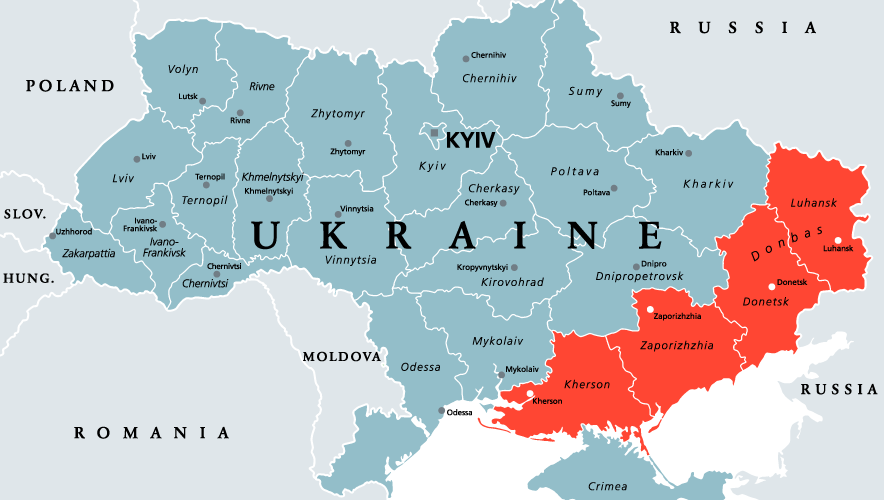Russia Escalates War Effort, Initiating Sham Elections and Conscripting 300,000 Additional Troops
Russian proxy authorities opened staged referendums Friday morning to tally support for an annexation of portions of Ukraine to place them under official Kremlin control.
The votes are being held in the Donetsk, Luhansk, Kherson, and Zaporizhzhia regions of Ukraine that are currently under Russian military control, although Ukraine has made advances to regain them in the past few weeks.
At a meeting of the United Nations Security Council focused on the conflict in Ukraine, U.N. Secretary General Antonio Gutteres warned Russia that plans to annex Ukrainian territory under the guise of referendums would violate the U.N. charter https://t.co/LL24jwtIgE pic.twitter.com/T8KvAurl1q
— Reuters (@Reuters) September 23, 2022
The referendums are illegal under international and Ukrainian law, and they also fail to meet the “basic standards for free and fair elections, not least because of the wartime occupation conditions, and displacement of large numbers of citizens,” according to The Washington Post.
World leaders have largely condemned the referendum efforts, dubbing them a “sham” to prepare for Russia to steal Ukrainian land, the Post reports.
“The balloting exercise reprises Moscow’s decades-old Stalinist playbook of staging illegal pseudo votes in neighboring nations, then insisting it followed the law when it invaded and occupied their territory,” the Post explains. “But by rushing ahead to stage the current votes, Moscow has broken even its own prior standard, that such votes should be held only after Russia has full military control of the regions, reflecting President Vladimir Putin’s concern that his troops face a real risk of defeat without a major military escalation.”
That risk was elevated earlier this week when Putin suggested that nuclear weapons might also be an option to win what he continues to call a “special military operation.”
“If the territorial integrity of our country is threatened, we will without doubt use all available means to protect Russia and our people—this is not a bluff,” Putin said in an address to the nation covered by Reuters, one of the few Western media outlets operating in the country. Putin also claimed that the West was plotting to destroy Russia, including engaging in “nuclear blackmail” by discussing using nuclear weapons against Russia.
“Whereas previous Kremlin statements appeared to be aimed at warning the United States and its allies against going too far in helping Ukraine, Putin’s most recent comments suggested Russia is considering using a nuclear weapon on the battlefield in Ukraine to freeze gains and force Kyiv and its backers into submission,” according to the Post.
The United States has sent private warnings to Russian leaders, advising them against using nuclear weapons and suggesting that there will be consequences if they are used, the Post reports. The consequences the United States has suggested, however, have been vague.
In his speech to the nation, Putin also announced he would mobilize an additional 300,000 troops to Ukraine—suggesting that the war will not soon be over. Individuals began receiving draft orders this week to report for training before deployment, the first time such orders have been issued in Russia since World War II.
The draft decision resulted in protests across Russia, leading to the arrest of at least 1,312 people, while thousands of others fled for the border in cars and via plane.
“Military-age men clogged airports and border crossings trying to flee, and some ended up in distant cities like Istanbul and Namangan, Uzbekistan,” The New York Times reports. “‘We decided that we don’t want to live in this country anymore,’ one reservist said after arriving in Turkey.”
The conscription effort is unlikely to significantly change the war effort, experts cautioned following the announcement. Andriy Zagorodnyuk, distinguished fellow at the Atlantic Council’s Eurasia Center and former Ukrainian Minister of Defense from 2019 to 2020, said that conscripts will need substantial new training before they are ready to serve on the battlefield.
“Secondly, personnel is only a part of the capability structure, and Russia has problems with all components of capability—doctrine, organization, leadership, and weapons,” Zagorodnyuk said in a news update. “Russia severely lacks experienced battlefield officers. It also struggles with renovating and delivering new weapons.”
Putin’s actions have further isolated him from world leaders, as displayed in speeches at the UN General Assembly in New York City this week. World leaders publicly rebuked Putin and Russia’s war against Ukraine, and the UN Security Council members—including China and India—issued harsh criticisms against Russia for aggravating the crisis and imperiling world security, the Associated Press (AP) reports.
Chinese Foreign Minister Wang Yi did not condemn the war but did say that China has a firm stance that “the sovereignty and territorial integrity of all countries should be respected. The purposes of the principles of the UN Charter should be observed.”
But many are skeptical that the rhetoric will have a real impact on Putin’s actions because he has placed his personal legacy on the line with the decision to invade Ukraine and still has allies of his own.
For a short moment at U.N. General Assembly, the world watched something rare: The top diplomats of two nations at war in the same room. https://t.co/rQxdsU7lna
— The Associated Press (@AP) September 23, 2022
“Russia is hardly isolated. Many of its allies depend on it for energy, food, and military assistance and are likely to stand by Putin regardless of what happens in Ukraine,” according to the AP. “Still, it was striking to hear Russia’s nominal friends like China and India, following up on last week’s remarks, speak of grave concerns they have about the conflict and its impact on global food and energy shortages, as well as threats to the concepts of sovereignty and territorial integrity that are enshrined in the UN Charter.”
Ukrainian authorities have also discovered several mass graves after reclaiming control of territories held by Russian troops, including in Izyum in eastern Ukraine. Investigators are now exhuming those graves to determine the causes of death for the bodies, but early reports suggest that many were killed by violence and potentially by torture.
Ukraine’s Prosecutor General Andriy Kostin spoke with PBS News Hour about the investigation efforts and the possibility of charging Russia with additional war crimes.
“Our teams are exhuming about 50—50 to 60 graves per day,” Kostin said. “We saw the same examples practically in every town and village of liberated Kharkiv region.”
The war in Ukraine is now in its seventh month, and the UN Human Rights Office has corroborated at least 14,059 civilian casualties as of 9 September 2022, with 5,767 people killed and 8,292 injured. An additional 12 million people have been displaced by the conflict.
“As we have repeatedly said, we know that actual numbers are likely considerably higher,” said Matilda Bogner, from the UN Human Rights Monitoring Mission in Odessa, Ukraine, in a press statement.
The UN is compiling updated official numbers to be released next week, but did disclose that it has confirmed at least 416 victims of arbitrary detentions and enforced disappearances in Russian-occupied territory or areas under its control; 16 were found dead while 166 others were released. The UN has documented 51 arbitrary arrests and more than 30 cases that may amount to enforced disappearances carried out by Ukrainian law enforcement bodies.



